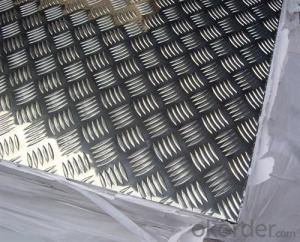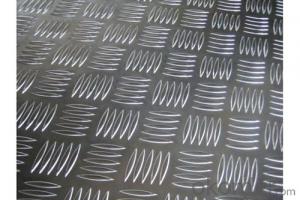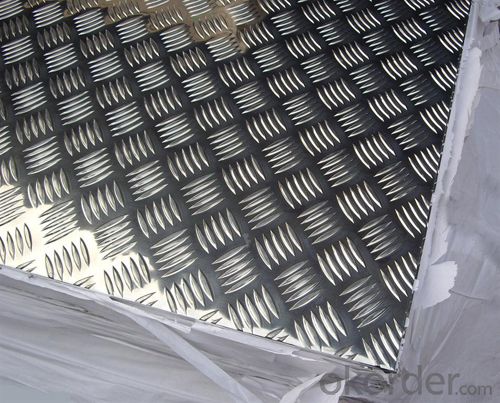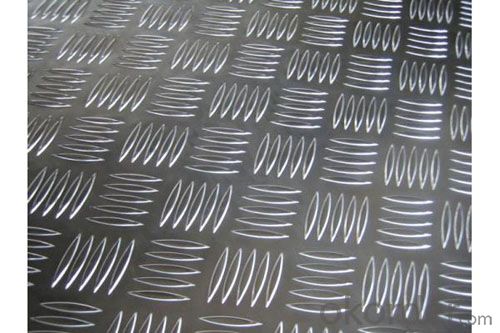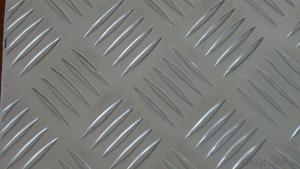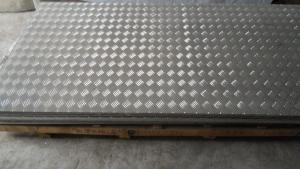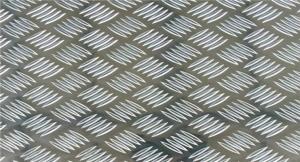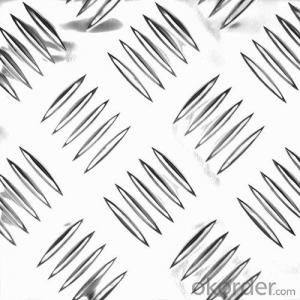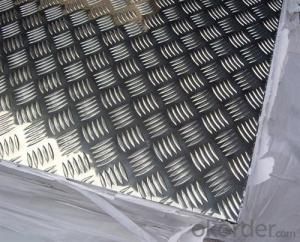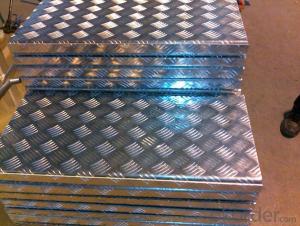5xxx Series Aluminum Coil - Aluminum Tread Plate with Five Bars Embossed Sheet
- Loading Port:
- China main port
- Payment Terms:
- TT OR LC
- Min Order Qty:
- 5 m.t.
- Supply Capability:
- 10000 m.t./month
OKorder Service Pledge
OKorder Financial Service
You Might Also Like
Specification
1. Description of Auminium Tread Plate with Five Bars Embossed Sheet
Alloy: 1050, 1060, 1100, 3003, 3005, 3105, 5052, etc
Thickness: 0.2mm~20mm
Temper: H14, 18, 24, 26, 32
Width: 10mm- 1500mm
2. Application of Auminium Tread Plate with Five Bars Embossed Sheet
(1).Interior: wall cladding, ceilings, bathrooms, kitchens and balconies, shutters, doors...
(2).Exterior: wall cladding, facades, roofing, canopies, tunnels,column covers , renovations...
(3).Advertisement: display platforms, signboards, fascia, shop fronts...
3. Feature of Auminium Tread Plate with Five Bars Embossed Sheet
*Such coil is specially designed to replace aluminum ingot, due to the high export tax of aluminum ingot, the coil has better price than ingot.
*This type of coil can fit customer's remelting furnace just like ingot, no need to make any change to the production line that was previously used for ingot. The standard coil size and weight is very suitable for the feed gate of furnace.
*This type of coil causes less material wastage than ingot when remelted.
*Our coil is made directly from ore, no need to go though the ingot making process, quality is much better than other suppliers who use ingot scrap to make coil.
Be free from Oil Stain, Dent, Inclusion, Scratches, Stain, Oxide Dicoloration, Breaks, Corrosion, Roll Marks, Dirt Streaks and other defect which will interfere with use
4. Certificate:
SGS and ROHS(if client request, paid by client), MTC(plant provided), Certificate of Origin(FORM A, FORM E, CO), Bureau Veritas and SGS (if client request, paid by client), CIQS certificate
5. Image of Auminium Tread Plate with Five Bars Embossed Sheet
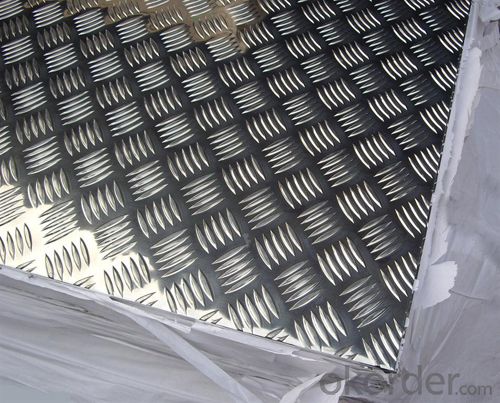
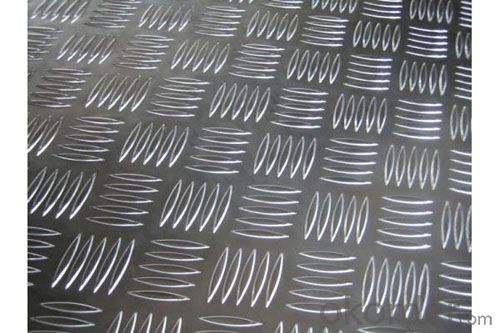
6. Package and shipping of Auminium Tread Plate with Five Bars Embossed Sheet
eye to sky
eye to wall
with wooden pallet (wooden case also available)
7. FAQ
1) What is the delivery time?
Dpends on actual order, around 20 days
2) What is the QC system:
We have QC staff of 20 persons and advanced equipment, each production is with MTC traced from Aluminum ingot lot.
3) What market do you mainly sell to?
Australia, America, Asia, Middle East, Western Europe, Africa etc
- Q: Can aluminum coils be used for sound insulation purposes?
- Yes, aluminum coils can be used for sound insulation purposes. Aluminum has excellent sound-dampening properties due to its density and ability to absorb and attenuate sound waves. Aluminum coils can be used in various applications such as in HVAC systems, automotive industry, and construction to reduce noise transmission. The coils can be installed in walls, ceilings, or ductwork to create a barrier that blocks or absorbs sound vibrations, thus improving sound insulation and reducing noise levels. Additionally, aluminum coils are lightweight, durable, and resistant to corrosion, making them a reliable choice for sound insulation solutions.
- Q: Are aluminum coils compatible with different welding methods?
- Yes, aluminum coils are compatible with different welding methods. Aluminum is a versatile metal that can be welded using various techniques such as gas tungsten arc welding (GTAW), also known as TIG welding, and gas metal arc welding (GMAW), also known as MIG welding. These methods are commonly used for welding aluminum coils due to their ability to produce high-quality welds with good strength and appearance. TIG welding is particularly suitable for aluminum as it allows for precise control of heat input and provides excellent weld quality. It uses a non-consumable tungsten electrode and an inert gas such as argon to shield the weld zone from atmospheric contamination. MIG welding, on the other hand, is a faster process that uses a consumable wire electrode and a shielding gas to protect the weld pool. It is widely used in industrial applications due to its efficiency and ease of use. In addition to TIG and MIG welding, other methods such as laser welding and friction stir welding can also be used for aluminum coils, depending on the specific requirements of the application. It is important to note that proper preparation, including cleaning and surface treatment of the aluminum coils, is crucial for achieving successful welds. This ensures the removal of any contaminants or oxide layers that may negatively affect the welding process. Overall, aluminum coils are compatible with different welding methods, and the choice of technique depends on factors such as the desired weld quality, production requirements, and the skills and equipment available.
- Q: Well, we've got the existing old school 7 layers of peeling yucky painted siding and we're trying to weigh our options. So here's my questions:1) Is it cost effective to replace Aluminum with Vinyl?2) Is Vinyl truly as costly as we keep hearing? **Home is small 1,100 sq.ft with a 2.5 car Garage**3) Is painting this existing siding a wise choice since the current paint job on it looks terrible? We just need to make it more a home, right now it's gorgeously all new and redone inside and on the outside it still resembles the day we bought it in forclosure. Aside from my green grass I busted my butt on last summer.Please advise.
- Aluminum Siding Vs Vinyl Siding
- Q: I need to draw dot and cross diagrams to explain how they bond, but if the aluminium outer shell has 13 electrons and the oxygen one has 6, how do they all become happy atoms, and all have a full outer shell? please help! thank you.
- I really do not know so ask somebody else
- Q: This question asks for methods to determine whether an aluminum coil is new or old.
- <p>To determine if an aluminum coil is new or old, you can look for several signs: 1. Surface appearance: New coils typically have a clean, smooth surface without scratches or discoloration. 2. Packaging: New coils are usually well-packaged and protected. 3. Manufacturing date: Check for any labels or markings that indicate the manufacturing date. 4. Quality of the material: New coils should have consistent thickness and no signs of corrosion or wear. 5. Performance: New coils should perform as expected without any issues. If you're still unsure, consider consulting with a professional or the supplier for more information.</p>
- Q: The temperature of the water drops from 93.0°C to 78.0°C. What quantity of heat energy did the piece of aluminum absorb?
- The specific heat of Aluminum is 0.215 cal/g-°C. The calories absorbed (q) would be q = m * c * (T2 -T1) = 22.0 g * 0.215 cal/g-°C * (78.0 °C - 0.3 °C) If you have a different value for the Specific heat of Aluminum, use it in the formula for your calculations. If you knew the mass of the water, you could check your calculations because the heat gained by the Al would be equal to the heat lost by the water, using q = m * c * (T2 -T1), where m is the mass of the water, c = 1.00 calorie/gram °C, T2 = 78.0 °C and T1 = 93.0 °C. The sign of q will be negative.
- Q: Briefly describe the process of aluminum production from bauxite. Describe the electrolyte and write the anode and cathode half-reactions.
- Bauxite is purified by washing with sodium hydroxide and then seeding with dry ice. The purified aluminium oxide is then dissolved in molten cryolite at 900 degrees C (the electrolyte). It is electrolysed with grapite anodes and a graphite cathode that acts as the vessel for the reaction. Anode; 2 O2- - O2(g) + 4e Cathode: Al3+ + 3e - Al(l)
- Q: Are there any restrictions on the export or import of aluminum coils?
- Yes, there are restrictions on the export or import of aluminum coils. These restrictions can vary from country to country and are typically imposed to protect domestic industries, ensure national security, or comply with international trade agreements. Governments may impose import or export duties, quotas, licensing requirements, or impose restrictions on certain countries for political or economic reasons. It is important to consult the specific regulations and trade policies of the countries involved to understand the exact restrictions in place.
- Q: Are aluminum coils suitable for insulation purposes?
- No, aluminum coils are not suitable for insulation purposes.
- Q: This question asks for the distinctions between aluminum coil and steel coil, focusing on their properties and uses.
- <p>Aluminum coil and steel coil differ in several aspects. Aluminum coil is lightweight, corrosion-resistant, and has good thermal conductivity, making it ideal for applications requiring flexibility and resistance to weathering. It's commonly used in construction, packaging, and electrical applications. Steel coil, on the other hand, is stronger and more durable, suitable for heavy-duty applications. It's often used in automotive, construction, and manufacturing due to its high strength and ability to withstand heavy loads. Steel is also magnetic, which is a property not shared by aluminum. The choice between aluminum and steel coil depends on the specific requirements of the project, such as weight, strength, and environmental resistance.</p>
Send your message to us
5xxx Series Aluminum Coil - Aluminum Tread Plate with Five Bars Embossed Sheet
- Loading Port:
- China main port
- Payment Terms:
- TT OR LC
- Min Order Qty:
- 5 m.t.
- Supply Capability:
- 10000 m.t./month
OKorder Service Pledge
OKorder Financial Service
Similar products
Hot products
Hot Searches
Related keywords
